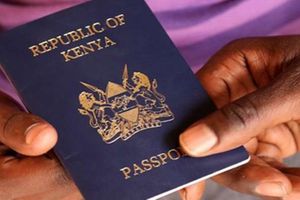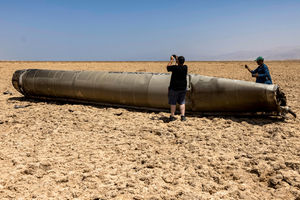China defends controversial Sierra Leone fishing project

Fishermen carry fish nets to Goderich Market in Freetown, Sierra Leone, on April 10, 2019.
What you need to know:
- The Sierra Leone government has earmarked over $1.3million to pay off landowning families which face forceful relocation to make way for the project.
The Chinese government has defended a controversial fishing harbour project in Sierra Leone, accusing critics of engaging in a smear campaign.
The Chinese embassy in Freetown has also slammed local and foreign media reports on the proposal, claiming they were based on a false narrative designed to counter China-Sierra Leone cooperation.
The Chinese-funded project is for a 252-acre piece of land that encompasses a rainforest and a beach in a community called Black Johnson, a renowned ecotourism attraction situated outside the capital, Freetown.
With an estimated cost of $55million, the project entails a fish landing site and a waste management component, according to the Ministry of Fisheries and Marine Resources (MFMR).
The MFMR says its objective is to centralise all fishing activities in order to increase the country’s capacity to export fish.
But campaigners say the project has the potential to cause a catastrophic impact on the environment, which would not only deprive residents of their main source of livelihood but also threaten the area’s tourism potential.
Compensation
The Sierra Leone government has earmarked over $1.3million to pay off landowning families which face forceful relocation to make way for the project.
An online petition, dubbed ‘Save Black Johnson Beach’, which was launched by the affected landowners, has been trending. It calls on the country’s President, Julius Maada Bio, to use his power and reverse the deal.
In a statement issued through the embassy’s economic and commercial affairs office, the Chinese stressed that the project is owned by Sierra Leone and that they were only providing assistance in response to a request by the West African country’s government.
Secrecy claims
Environmentalists say the deal was negotiated in secrecy and that the government only issued a statement confirming it after details were leaked on social media, sparking public outcry.
They are therefore challenging the government to publish the Environmental Impact Assessment report on the proposed project.
However, in its statement, the Chinese embassy notes that concerns about environmental risks were unfounded.
The embassy says the site selection and environmental impact assessment were determined by the government in accordance with its own laws and administrative procedures.
“Some people make relevant remarks about the project in the name of environmental protection. However, their real intention may not be to protect the environment but to hinder implementation of the project and thus hinder the economic and social development of Sierra Leone,” says Du Zijun, Economic and Commercial Counsellor of the Embassy of China in Freetown.





